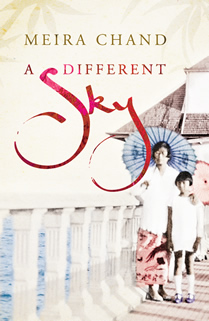 I begin with a shamefaced confession. I discovered Meira Chand only a few months before I moved to Singapore, and thats when I made up my mind to read A Different Sky.
I begin with a shamefaced confession. I discovered Meira Chand only a few months before I moved to Singapore, and thats when I made up my mind to read A Different Sky.
One thing about reading a novel you soon find yourself engrossed in, is that you want to read more about the author. And so, I was greatly intrigued by Chand’s oeuvre in the genre of historical fiction. Chand grew up in Europe, and moved to Japan and is presently based in Singapore and her fiction (and she is largely a writer of big novels) move around these countries, especially their histories.
Her novels are big because they seem to deal with several important themes, and these appear in large measure, even in A Different Sky. The theme of what an ‘outsider’ can really mean, who decides questions of identity, and how can this be shaped, and there is also the careful unravelling of the multifarious, even hidden cultures that define a place, and Chand does this beautifully and subtly that it enriches your understanding of a place and time.
A Different Sky is a big novel at 500 pages, but never for a moment or over a page does a reader’s interest slag nor does it become putdown able.
Meira Chand’s A Different Sky is set in Singapore, in the politically chaotic period, of the 1920s and 1950s. Singapore was at that time a British colony. At 500 pages, the book brings in different
characters from different communities who made (and still do) up Singapore.
So there is Howard Burns, an Eurasian (who has strains of Portuguese, English, Malaccan in him); Mei Lan, Chinese, from a family of Chinese immigrants who came rich from at times dubious deals.
And there are those like Raj, a poor village boy from Tamil Nadu in southern India who sails to Singapore in the hope of a better life, and makes it. There is Shinozaki – a Japanese who is a good Samaritan of sorts; Wilfred, British but with his heart in Malaysia ; ‘Wee Jack’ working
for the British, later, a secret communist agent, and many others.
What is common about these characters is that they seem to actually belong ‘nowhere’; and as the novel progresses, you realise that as they try and come to understand their destiny, it is also in a way
Singapore’s history (for the most part, a colonial history).
Besides the love story, which seems ill-fated from the very start of Howard and Mei Lan, the book is interesting for the many details it throws on events during the second world war when Singapore tragically found itself at the heart of the war theatre. The brutality of war, how loyalties could change, or even be doubted, was even more amplified because of its being a small island, strategically located.
So for example, the Japanese in Singapore suspected to be agents, were first shipped off to camps in India. The Japanese retaliated later, sending British POWs to work as slave labour (immortalised in
Bridge on the River Kwai).
I would recommend the book because of its authenticity to detail – every small detail really like how one smokes opium, how to pluck leeches off your body and the brutal torture methods used by the Japanese, the Indian National army meetings etc. It also brings alive facets of a region that is interestingly contradictory to its present day image of a city-state whose organisation, reach and efficiency are emulated worldwide.
But the skill in doing a ‘big book’ is how to manage the book’s thematic story (main story vis a vis other stories) and its many characters. and obviously there are parts which come alive when you
like a character/s more than others. Moreover, Chand touches too much on giving the actual political details and sometimes in a work of fiction, it is difficult to juxtapose authenticity vs the insistent demands of the imagination.
Still you emerge with a new understanding, a sense of empathy too, and this is why reading the book is such an enriching experience. I am hoping to read A house of the sun which deals with Sindhi refugees in post Partition Bombay; A Far Horizon set in Calcutta in 1756, a chaotic, transitory time when the East India Company had yet to emerge fully as a ruler in its own right, and The Bonsai Tree one of her early novels which deals with a young British wife coming to terms with the culture of new country, Japan. In fact, am hoping I can read all her works. Meira Chand is a fascinating writer and deserves to be more widely read.





